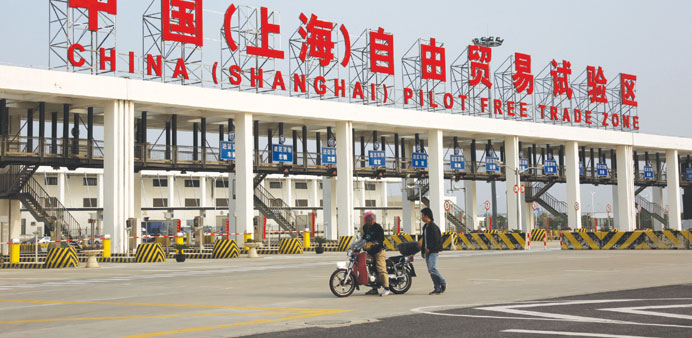China now allows firms, both non-financial and financial, in the free trade zone in Shanghai to borrow up to twice their capital base, double the previous limit.
Reuters/Shanghai
China has opened the door of its tightly-controlled capital account a fraction wider by allowing firms operating within its Shanghai free trade zone to borrow funds without having to go through complicated regulatory hurdles.
Firms – both non-financial and financial – in the free trade zone in Shanghai will now be able to borrow up to twice their capital base, double the previous limit allowing them greater access to cheaper offshore financing.
Firms in the free trade zone will be allowed to determine their own level of foreign capital financing exposure, according to the central bank’s statement.
Banks operating in the zone can raise funds either in foreign or domestic currency. Non-bank financial institutions such as securities firms can also import foreign capital but domestic firms are urged not to rely on short-term financing, authorities said.
“It is a positive step in terms of liberalisation of the capital account for the corporate sector,” said Eddie Cheung, a foreign exchange strategist at Standard Chartered Bank in Hong Kong.
Strategists say the latest steps indicate Beijing is looking to accelerate its reform agenda by allowing foreign companies greater flexibility in operating on the mainland and perhaps counter some of the large capital outflows it saw last year.
By allowing greater access to companies to overseas markets, China is hoping to reverse some of the flows and boost the attractiveness of the free trade zone, where the incremental pace of opening has been greeted with lukewarm enthusiasm among foreign companies in recent months.
“This specific decree means that the capital account for firms in the free trade zone has effectively been opened, another step towards actively deepening capital account opening in China,” said Shanghai PBoC deputy director Zhang Xin on Thursday.
China launched the Shanghai free trade zone in September 2013 and officials promised a far more open and streamlined environment for foreign firms to do business there, along with the relaxation of policies for a raft of service sectors.
In recent months, it has speeded up the reform initiative by expanding the footprint of the free trade zone and allowing full foreign ownership of e-commerce firms in Shanghai.

